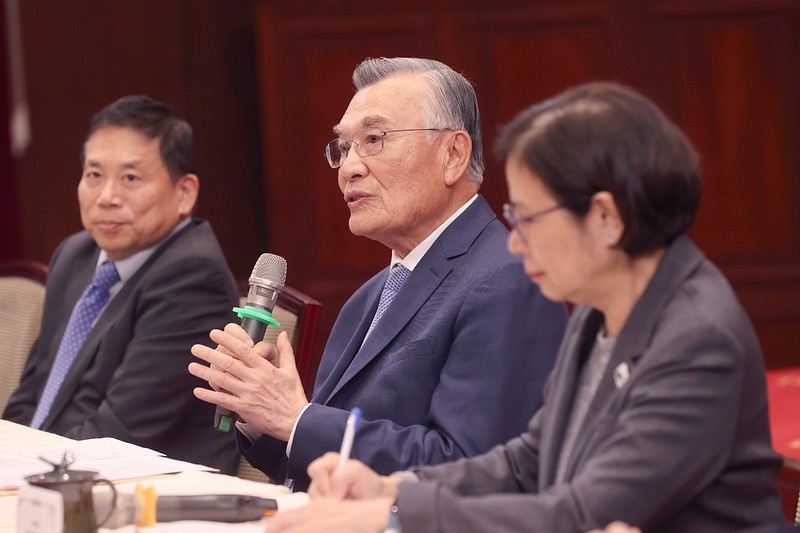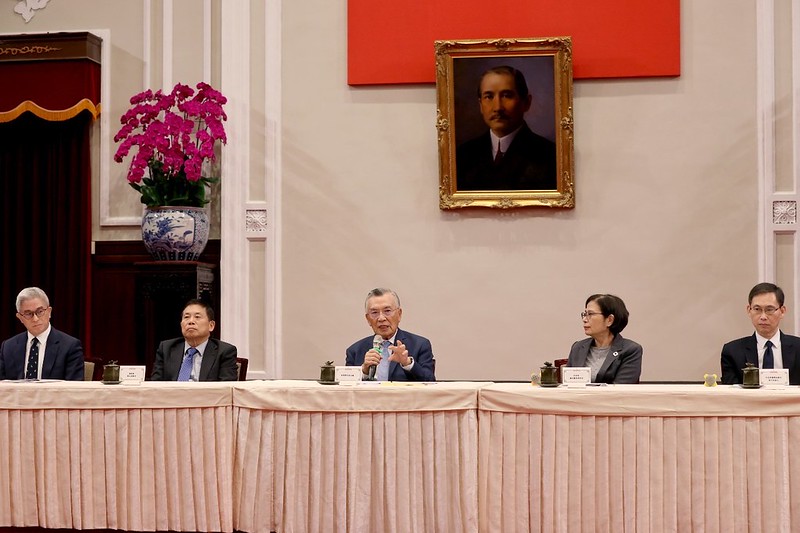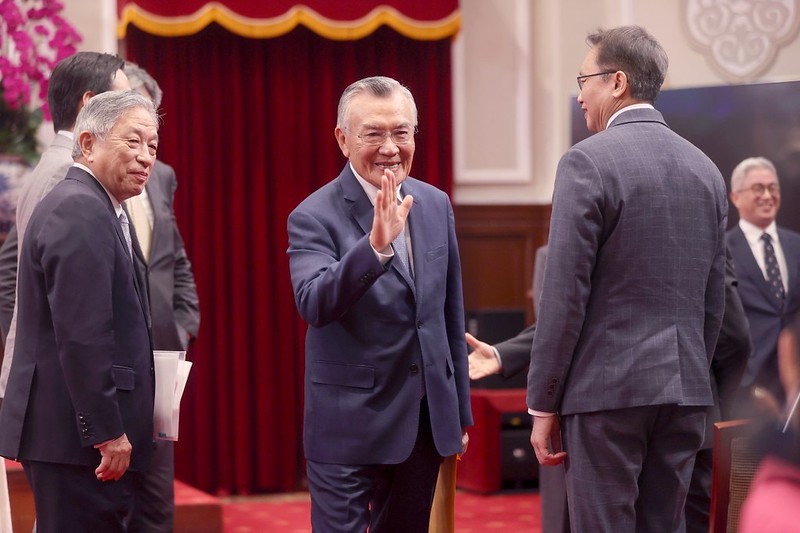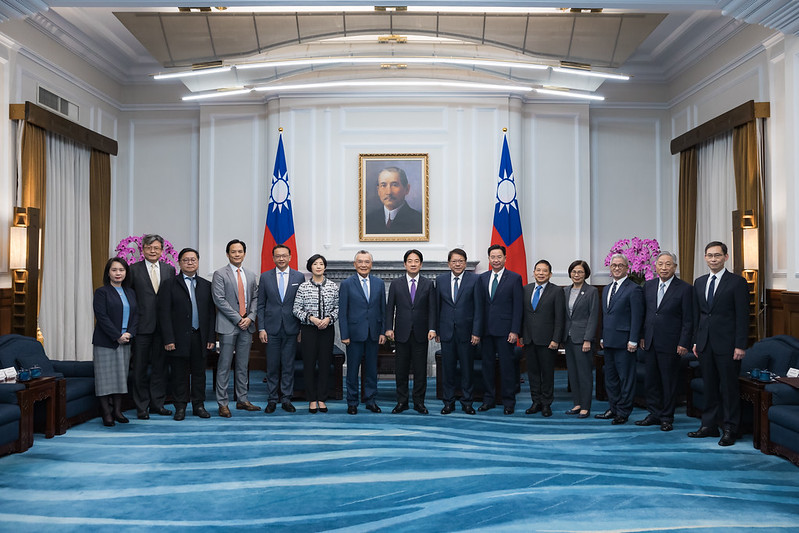News & activities
 News releases
News releases
On the afternoon of November 20, the Presidential Office held a press conference for our delegation to the 2024 APEC Economic Leaders’ Meeting (AELM) upon its return to Taiwan. Leader’s Representative Lin Hsin-i (林信義), accompanied by Minister without Portfolio of the Executive Yuan and National Development Council Minister Liu Chin-ching (劉鏡清), Minister without Portfolio of the Executive Yuan Yang Jen-ni (楊珍妮), National Security Council Deputy Secretary-General Hsu Szu-chien (徐斯儉), and Director General Jonathan C.Y. Sun (孫儉元) of the Ministry of Foreign Affairs’ Department of International Organizations as Senior Official for APEC, explained the overall situation at this year’s APEC meetings and the outcomes of the AELM, and fielded questions from the media.
In remarks, Leader’s Representative Lin said he was honored that President Lai Ching-te entrusted him to lead a delegation as leader’s representative to attend this year’s AELM. Thanks to the concerted efforts of various government ministries and agencies, and close communication between the frontline and backend support in Taipei, he said, our participation went smoothly, achieving certain results and effectively raising Taiwan’s visibility in APEC.
Leader’s Representative Lin said that the discussions at this year’s AELM were comprehensive and diverse. Leaders representing other member economies were quite concerned about the current challenges the globe needs to face together, he said, and actively exchanged views in various venues, hoping to forge a consensus to establish guiding principles for cooperative responses. He explained that those challenges include geopolitical changes, public health, energy crises, inflation, food security, supply chain fragmentation, glocalization development, and climate change. During the Leaders’ Retreat on November 16, International Monetary Fund Managing Director Kristalina Georgieva warned that trade protectionism has entailed a retreat from global economic integration and trade no longer being such a powerful driver of growth.
Leader’s Representative Lin stated that he shared Taiwan’s development experiences during relevant meetings. He pointed out that the traditional economic and trade model of the past failed to benefit everyone, creating massive wealth and development disparities, and reminded all of the economic leaders to see the importance of both the quality of economic development and inclusive growth.
Leader’s Representative Lin stated that during this year’s Economic Leaders’ Week, he and Minister Liu, Minister without Portfolio Yang, and all the members of the delegation completed the three tasks assigned by the president, including the first: to convey that Taiwan looks to actively contribute to the international community. He noted that a number of the economies expressed great interest in Taiwan’s accomplishments in areas including artificial intelligence (AI), digital medicine, semiconductors, energy transition, and small and-medium-sized enterprise (SME) resilience. Because Taiwan has very comprehensive policy planning, he said, the government plays a key role in promoting economic development. He added that we have successfully integrated the power of private sector innovation and aligned ourselves with the international community, not only enhancing Taiwan’s competitiveness, but also providing other economies with our valuable experiences.
Leader’s Representative Lin mentioned that during the proceedings he had shared what Taiwan has been doing to promote development of digital health and AI, and that he had explained that Taiwan, as the leader of the Digital Health Sub-working Group of APEC, is actively promoting telemedicine, epidemic prevention applications, and digital health governance. Since 2019, he said, Taiwan government agencies have submitted 31 digital health initiative proposals to APEC, amply demonstrating that our country is willing to help promote fair and inclusive public health environments that will bring positive benefits to all of humanity.
Leader’s Representative Lin said that APEC economies are concerned about how to properly regulate the use of AI and believe that public-private cooperation is needed to exercise suitable regulation over its use and governance so that it will become a tool that benefits all of humanity. Speaking on the outstanding performance of Taiwan’s three APEC Business Advisory Council (ABAC) representatives, he mentioned the Do AI Locally Yourself (DAILY) program promoted by Quanta Computer CTO Ted Chang (張嘉淵), explaining that DAILY seeks to enable medical practitioners with no coding ability to develop AI models, which promotes health equality. He also mentioned that enterprises in Taiwan have used fundus tomography to detect macular degeneration, a procedure now in use at 306 hospitals in 11 different countries. In addition, the leader’s representative said, Taiwan Mobile President Jamie Lin (林之晨) spoke about the Language Insert AI Special Edition (LIAISE) workshop, which introduced the other economies to a real-time AI translation tool which is especially useful for micro-, small- and medium-sized enterprises as well as female business owners that engage in international trade, contributing to inclusive growth.
On the topic of food security, Leader’s Representative Lin said that he shared our efforts in Taiwan over the course of many years to reduce food loss and waste and achieve greater efficiency in food supply chains, including the use of AI technology to increase agricultural yields. These efforts, he added, have enhanced Taiwan’s food security and provide successful models that can serve as reference for APEC economies in dealing with global food crises and making their food supply chains more resilient.
Leader’s Representative Lin then turned to the second task, namely to convey that Taiwan supports a fairer and more inclusive international trade order. He noted that there have recently been many criticisms of the function of the World Trade Organization (WTO). The leader’s representative, during discussions which included Acer Chairman Jason Chen (陳俊聖) and ABAC representatives from New Zealand, emphasized that Taiwan believes that, moving forward, the WTO must continue to play a core role in international trade, maintaining a fair, stable, and open trading system, and leading in the development of new regulations for trade and investment. He added that Taiwan supports reform of the WTO, including the reinstatement of a comprehensive dispute resolution mechanism, the launch of a new round of market access negotiations, and discussions regarding core trade and investment issues, such as trade and industrial policy, economic empowerment of women and disadvantaged groups, and spurring the emergence of a fair and open competitive trade order for the new age. At the same time, he said, APEC economies should properly appreciate the importance of promoting inclusive economic growth. He said that Taiwan, Australia, Canada, and New Zealand joined forces in 2022 to establish the Indigenous Peoples Economic and Trade Cooperation Arrangement (IPETCA), noting that its purpose is to promote the economic empowerment of indigenous peoples in the Asia-Pacific region and to provide trade and economic opportunities that will help indigenous peoples achieve economic autonomy.
On the third task, that Taiwan is willing to promote the development of digital trade among other economies, Leader’s Representative Lin said that digital trade has already become an important part of global trade. He said that Taiwan is confident we can use our strengths in digital technology – a point of pride for Taiwan – to continue spurring economic development and prosperity worldwide. This year’s leader’s declaration, he said, included advancing for all member economies an inclusive economic growth agenda that helps women, indigenous peoples, and disadvantaged groups address economic structural reforms. It also stressed, he added, the importance of ensuring energy security and increasing renewable energy capacity in order to effect a just energy transition and sustainable growth. He pointed to the declaration’s mention of digital tools and their importance in achieving inclusive growth as well as its recognition of the potential of AI for transforming various aspects of daily life across the Asia-Pacific region. As those are the fields in which Taiwan holds strengths and advantages, he said, we are very happy to see them included in this year’s leader’s declaration as the consensus of the member economies.
Leader’s Representative Lin said that during the proceedings of the leaders’ meeting, he announced on behalf of our government that Taiwan will be donating US$1 million to APEC in support of its research capabilities and its initiatives in human security, digital innovation, and women’s economic empowerment, which will aid capability building in developing economies. He pointed to the donation as demonstrating Taiwan’s active role in several leading issues and added that it will allow us to be a major part of promoting global economic development.
Leader’s Representative Lin, citing digital innovation and green economic transformation as examples, explained that particularly in terms of climate change response, hydrogen energy will become an important area of focus for all in the future. He then called on APEC to strengthen cooperation among its members to implement the APEC Policy Guidance to Develop and Implement Clean and Low-carbon Hydrogen Policy Frameworks in the Asia-Pacific, passed at this year’s Energy Ministerial Meeting, and indicated that Taiwan is also actively advancing green finance and sustainable economic growth. Many economies value such experiences, he said, and have pursued innovation and development through cooperation. The leader’s representative stated that during meetings, he actively took various opportunities to interact with leaders from other countries, and that he also conversed with eight Taiwanese youth representatives who traveled to Peru to participate in APEC’s Voices of the Future program.
Leader’s Representative Lin emphasized that Taiwan has always upheld the spirit of inclusivity and cooperation, and has showed willingness to share our experiences regarding development with countries around the world. He said that looking ahead, we hope to expand exchanges with APEC economies to include even more issues and meet all challenges together. Taiwan will continue to collaborate with all APEC economies to make even more contributions to regional stability and prosperity, he said.
Leader’s Representative Lin then responded to questions from the media on how to strengthen Taiwan-Japan cooperation, his experience attending the APEC meetings again after a hiatus of 19 years, and Taiwan-United States relations, among other topics.












